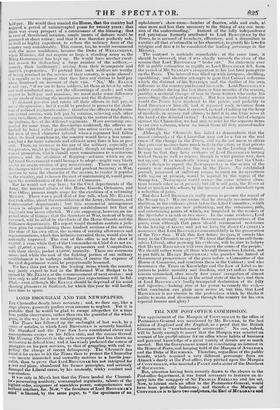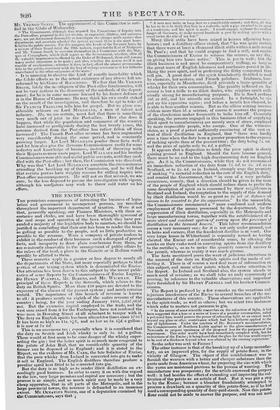THE NEW POST-OFFICE COMMISSION.
THE appointment of the Marquis of CONYNGIIAM to the office of Postmaster-General was mentioned by Mr. Butevee, in the last edition of England and the English, as a proof' that the British Government is " unwholesomely aristocratic." No une, indeed, will be hardy enough to assert that the Marquis was selected on account of his qualifications fer an office where habits of business and personal knowledge of a great variety of details are so much needed. But the Government aimed at conciliating an interest in the House of Peers, and keeping hold of the Marquis of ANGLESEA and the Duke of Ric HMOND. Therefore, regardless of the public benefit, which required a very different personage from an Almacles dandy at the Post-office, they pitched upon the Marquis of CONYNGHAM, who married a PAGET and a sister of the Dutchess of RICHNIOND.
But, attention having been recently drawn to the abuses in the Post-office department, it was found necessary to institute an in- quiry into the snuggery of Sir FRANCIS FREELING and his set. Now, to intrust such an affair to the Postmaster-General, would have been perfectly ludicrous; and therefo.e the Marquis of CONYISGHAM is to have two coadjutors, the Earl of IduLuaavs and Mr. VERNON SMITH. The appeintmeal or this Committee is noti- fied in the Globe of Wednesday. "The Government, although they rizbposed the Commission .-af Inquiry into the Post-ofiice, proposed in the at smsion, as expensive, dilatery, and unneceF. warn are yet determined thoroughly to investigate the charges made against that department. and ascertain whetlyr the system pmsued there is the most bene- ficial for the public service. For this purpose, the Lords of the Treasury have, by a minute of their Bowl dated the 19th iustant, requested the Earl of Mulgrave and Mr. Vernon Smith to associate themselves in a Committee with the Mar- quis of Conyngham, which shall report to the Government, whether, after all th, valuable improvements effected by the Duke of Richmond, there still remain many useful alterations to be made; and also, whether the system itself is not capable of amelioration—whether it does, in fact, afford the utmost accommoda- tion to the public, consistent with the levy of so large a revenue as it has hitherto contributed to the other exigencies of the state." It is amusing to observe the kind of courtly incredulity which the Globe affects as to the actual existence of any abuses left un- reformed by his Grace of atellISIOND. We fear that Mr. VERNON SMITH, lately the mouthpiece of the Post-office functionaries, will riot be very zealous in the discovery of the misdeeds of the depart- ment; for be is in some measure biassed by his former defence of it in the House of Commons. Ile may think his own credit staked on the result of the investigation, and therefore be apt to take all Sir FRANCIS FREELING tells him for gospel. But we place con- siderable reliance on Lord MULGRAVE, a man of talent and industry. He, we are certain, must feel that there is something very much out of joint in the Post-office. How else does it 'happen, that while the population and commerce of the country have increased so prodigiously during the last twenty years, the revenue derived from the Post-oflice has rather fallen off than increased? The French Post-oflice revenue has been augmented very eonsiderably dining, the same period, and is constantly growing larger. Let Lord MULGRAVE ponder these facts well ; and let him also give the Revenue Commissioners credit for some industry and knowledge of business, instead of throwing aside their Reports as mere waste paper. Lord WA Lb ACE and his brother Commissioners were able and useful public servants, until they med- dled with the Post-office; but then, the Commission was dissolved. Why was that' Let Lord MULGRAVE ascertain the circumstances attending the breaking up of that Commission, and he will find that certain parties have weighty reasons for stifling inquiry into Post-office mismanagement. Ile will not on that account, we are sure, be the less disposed to pursue the investigation with vigour, although his coadjutors may wish to throw cold water on his efforts.



















 Previous page
Previous page